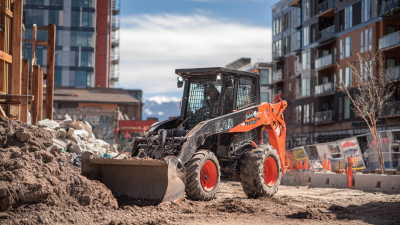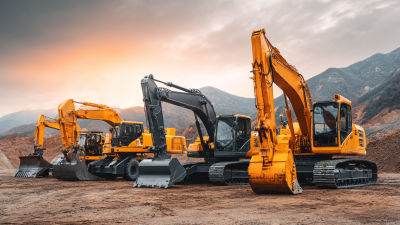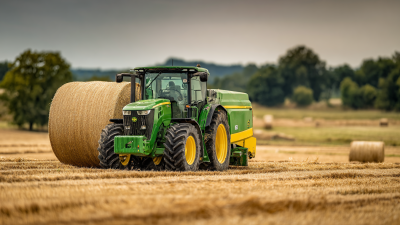How to Choose the Right Micro Tractor for Your Small Farm: A Comprehensive Guide
When it comes to small-scale farming, the choice of equipment can significantly influence efficiency and productivity. One of the most versatile machines available today is the micro tractor, a compact and powerful solution designed to meet the diverse needs of small farmers.

According to a recent report by the American Society of Agricultural and Biological Engineers, micro tractors have seen a 25% increase in adoption over the last five years, driven by their ability to navigate small fields and perform multiple tasks with ease.
Micro tractors are particularly beneficial for farmers managing limited acreage, as they combine the advantages of larger tractors without the associated footprint and expense. Data from the USDA indicates that over 50% of U.S. farms are classified as small, underscoring the rising demand for machinery that caters to smallholder farming.
When choosing the right micro tractor, it’s essential to consider factors such as power, size, and functionality to ensure it aligns with your specific operational needs. This comprehensive guide will help you understand the critical aspects of selecting the ideal micro tractor for your small farm, allowing you to maximize productivity while minimizing investment costs.
Understanding Your Farm's Specific Needs for a Micro Tractor
When selecting the right micro tractor for your small farm, it's crucial to understand the specific needs of your agricultural operations. Begin by assessing the size and layout of your farm; for instance, whether you have narrow paths or tight spaces can significantly impact the type of micro tractor you choose. Additionally, consider the types of tasks you'll be performing, such as tilling, planting, or hauling. Different models feature varying horsepower and implement compatibility, tailored to execute specific duties effectively.
Evaluate the terrain and soil type of your farm, as these factors can influence tractor performance. If your land is hilly or uneven, you may require a tractor with better traction and stability. Furthermore, assess your budget and the long-term investment implications; some micro tractors offer more advanced technology or attachments that may be beneficial for your operations. By carefully examining these aspects, you can make an informed decision, ensuring that the micro tractor you choose aligns with your farm’s unique requirements and enhances your productivity.
Key Features to Consider When Selecting a Micro Tractor
When choosing the right micro tractor for your small farm, several key features should guide your selection process. First and foremost, consider the tractor's size and weight. Micro tractors are designed to be compact, making them ideal for navigating tight spaces, but you'll want to ensure that the model you choose can handle the specific tasks you'll be doing, from tilling to transporting materials. Additionally, assess the ground clearance and turning radius, as these factors significantly impact maneuverability on uneven terrain.
Another crucial aspect to evaluate is the powertrain options available. Micro tractors often come with either two-wheel or four-wheel drive, which can affect traction and performance in various conditions. If your farm has muddy or challenging landscapes, a four-wheel-drive model might be more suitable. Moreover, pay attention to the available attachments and implements. A tractor that can be easily outfitted with a plow, mower, or other tools will enhance its versatility, enabling you to tackle diverse farming tasks efficiently. By focusing on these features, you'll be better equipped to select a micro tractor that meets your specific farming needs.
Micro Tractor Features Comparison
Comparing Different Types of Micro Tractors: Gas vs. Electric
When choosing a micro tractor for your small farm, the debate between gas and electric models is pivotal. Gas micro tractors have long been favored for their raw power and longer operational range, making them suitable for extensive tasks that require heavy lifting or sustained energy. They typically provide a robust solution for farmers who need to cover larger areas quickly and efficiently. However, with advancements in technology, electric micro tractors are emerging as a compelling alternative. Recent studies have demonstrated that electric models can match the power requirements for various agricultural tasks, making them increasingly reliable for small farm operations.
Electric micro tractors offer several advantages that are gaining traction among environmentally conscious farmers. With significant developments in battery technology, many electric models now feature extended runtimes that can handle a full day’s work without needing a recharge. Additionally, electric tractors produce less noise and eliminate exhaust emissions, contributing to a more sustainable farming practice. As certain electric models have been tested rigorously in different agricultural settings, their performance has proven to be impressive, comparable to their gas counterparts. As you evaluate options, consider your farm’s specific needs and the long-term benefits of incorporating electric technologies into your farming practices.
Budgeting for Your Micro Tractor Purchase and Maintenance Costs
When considering the purchase of a micro tractor for your small farm, budgeting is a crucial step that should not be overlooked. The initial cost of a micro tractor can vary significantly based on brand, features, and specifications. It's essential to establish a clear budget that encompasses not only the purchase price but also additional expenses such as taxes, delivery fees, and necessary attachments that may enhance the tractor's functionality.
Maintenance costs are another critical aspect of budgeting that can often be underestimated. Routine maintenance, which includes oil changes, filter replacements, and general inspections, should be factored in to ensure longevity and optimal performance of your micro tractor. Additionally, it’s wise to allocate funds for repairs that may arise over time as well as for any potential upgrades or attachments that could increase efficiency on your farm. A well-planned budget will enable you to make an informed decision and ensure that you can fully sustain your micro tractor investment throughout its operational lifespan.
Evaluating Brand Reputation and Customer Support for Micro Tractors
When selecting a micro tractor for your small farm, evaluating brand reputation and customer support is crucial. A brand with a solid reputation often signifies quality machinery and reliable performance.
Consider companies that have been in the industry for several years and have received positive reviews from farmers. Look for testimonials that specifically mention durability, ease of use, and efficiency. Engaging with online forums and agricultural communities can also provide insights into how specific brands hold up under real-world conditions.
Customer support plays an equally vital role in your decision-making process. A reliable manufacturer should offer comprehensive support, including easy access to replacement parts and responsive customer service. Research whether the brand provides timely assistance with maintenance and troubleshooting.
Additionally, assess whether there is an established network of local dealers or service providers, as this can significantly reduce downtime in case of repairs.
Prioritizing brands that are known for their strong customer support can lead to a more satisfying ownership experience, ensuring that your micro tractor remains operational and effective on your farm.
Related Posts
-

Revolutionizing Golf Course Care: The Ultimate Guide to Choosing the Right Lawn Mower
-

Essential Checklist for Choosing the Right Small Front Loader Tractor
-

Why Skid Loaders Are Essential for Modern Construction: Exploring Industry Trends and Efficiency Stats
-

Exploring the Future of Heavy Equipment Trading: Trends and Insights for 2024
-

How to Choose the Right Small Tractor Mower for Your Lawn Care Needs
-

How to Choose the Best Round Baler for Your Farm Based on Yield and Efficiency Insights